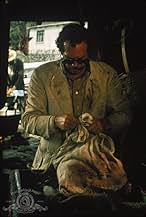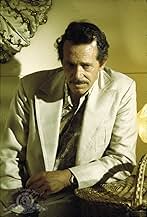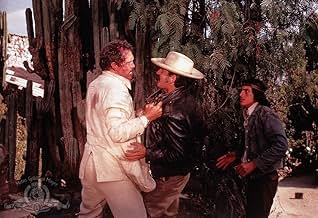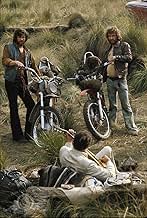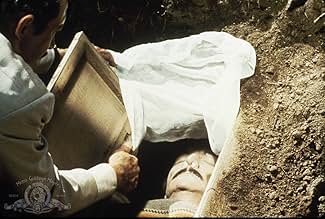Tráiganme la cabeza de Alfredo García
Título original: Bring Me the Head of Alfredo Garcia
CALIFICACIÓN DE IMDb
7.4/10
23 k
TU CALIFICACIÓN
Un pianista de bar estadounidense y su novia prostituta viajan por el inframundo mexicano para cobrar la recompensa por la cabeza de un gigoló fallecido.Un pianista de bar estadounidense y su novia prostituta viajan por el inframundo mexicano para cobrar la recompensa por la cabeza de un gigoló fallecido.Un pianista de bar estadounidense y su novia prostituta viajan por el inframundo mexicano para cobrar la recompensa por la cabeza de un gigoló fallecido.
- Dirección
- Guionistas
- Elenco
- Premios
- 2 nominaciones en total
Emilio Fernández
- El Jefe
- (as Emilio Fernandez)
Donnie Fritts
- John
- (as Donny Fritts)
Chalo González
- Chalo
- (as Chalo Gonzalez)
Opiniones destacadas
This dark, almost nihilistic film is apparently the only one of Peckinpah's not to be interfered with by a studio or someone of similar standing. The result is exactly what its director intended, a gritty and slow-burning pseudo neo-noir that takes its time getting to the squib-squirting shootouts that Peckinpah is known for. The story is centred around a head: the head of Alfredo Garcia, to be exact. After he impregnates a gang boss' young daughter, the man finds himself on the wrong end of an assassination contract. That's where our protagonist comes in; Oates' dive-bar pianist knows someone who knows where Garcia is, so he sets out to make some quick cash but gets much more than he bargained for. Most of the first half of 'Bring Me The Head Of Alfredo Garcia (1974)' is dedicated to the relationship between the hero and his girlfriend, which is given the time it needs to feel real. It's the underlying heart of the narrative. After a certain point, the picture takes a sharp turn and becomes a lot more bloody. Its final third sees its protagonist try to justify his actions in increasingly dangerous ways, taking violent risks seemingly for no real reason. In the end, though, that's the point: none of it was worth it and any reasoning is futile. It's a bleak conclusion, for sure, but it makes for a stark and distinct experience. Once it gets properly underway, the piece is rather enjoyable in a pulpy sort of sense. It's compelling to see our hero go through his downward spiral and there's this looming feeling of dread that builds as the thing approaches its conclusion. It's a dark flick, but it's often entertaining and is held together by a decent central relationship. 7/10
This dark and brutal film involves Benny, an American piano player in Mexico (played by Warren Oates) who gets involved with bounty hunters searching for the head of Alfredo Garcia. The head is worth one million dollars, because Garcia got the daughter of a very wealthy and powerful man, pregnant.
The film features plenty of Sam Peckinpah's trademark slow-motion violence in some very well-staged action set pieces. The cast (particularly Oates and Isle Vega, as his Mexican girlfriend) are good, and the film conjures up a powerful atmosphere of despair and casual cruelty and violence.
The film , however, features moments of genuine tenderness between Oates and Vega. Oates plays Benny as a man on the edge. Basically decent but forced to do some pretty horrible things to survive.
Reviled by critics on it's first release, this film will prompt some strong reactions in viewers. While not one of Peckinpah's best films, his enormous talent is still visible throughout this film.
The film features plenty of Sam Peckinpah's trademark slow-motion violence in some very well-staged action set pieces. The cast (particularly Oates and Isle Vega, as his Mexican girlfriend) are good, and the film conjures up a powerful atmosphere of despair and casual cruelty and violence.
The film , however, features moments of genuine tenderness between Oates and Vega. Oates plays Benny as a man on the edge. Basically decent but forced to do some pretty horrible things to survive.
Reviled by critics on it's first release, this film will prompt some strong reactions in viewers. While not one of Peckinpah's best films, his enormous talent is still visible throughout this film.
First, I'm sure everyone commenting on this film has seen the documentary on Peckinpah, and the comments made by the film critics regarding this film. If I may quote one of the critics, and I'm sure you all agree "It's the one film of Peckinpah's that everyone tries to imitate". Even Tarantino does to some degree. I have issues with Quentin Tarantino from a cinematic and artistic point of view, but that is another review. Warren Oates' performance was flawless, as he actually assumes the identity Of Sam Peckinpah as a gesture of appreciation for gracing him with his first starring vehicle.
Warren Oates was taking Sam's journey for him, as Sam looked from behind the lens. This movie was Peckinpah at his best and his worst at the same time. The old Peckinpah themes are there; Mexico is the final frontier, where one can continue to be what he once was in a changing world, but eventually Mexico begins to change as well. As I said in my review of "Junior Bonner" (be sure to check it out, and get back to me)progress is the main antagonist in the lives of Peckinpah's characters.
Junior Bonner and Bennie (Oates' Character) have a common foe, the twentieth century, which is why we find Bennie in Mexico. The chance to improve his situation, and establish a solid relationship with his hooker girlfriend (played with tough sincerity by Isela Vega) arrives at a time in Bennie's life when he least expects it, but it's not as easy as it is set out to be. All he has to do is bring this head to "El Hefe", and at the last minute BAM!! Bennie grows a conscience. Along the way he loses his woman, and then just goes nuts, thus revealing "The Diseased Soul of Sam Peckinpah".
My favorite scene is actually the picnic, where Elita and Bennie discuss their future. Elita begs Bennie to ask her to marry her, he does and she begins to weep. The simple fact that he says it is a tender moment, and shows how the slightest thing can arouse a woman's emotions. Jerry Fielding's musical score, which successfully created the mood and atmosphere for "Straw Dogs" (my all time favorite Peckinpah film) is present, but very muted. Still, this may be the best scene of the film.
Sam Peckinpah finally had complete control to dictate the direction of this film; Free from the money men, and left to his own devices in Mexico where he felt at home. A lot of people say that Pat Garret and Billy the Kid was the last Peckinpah masterpiece, but I think Alfredo Garcia was the last one. It throws you off at the beginning with the horses, then all of a sudden a Corvette screeches by; This is the paradox that really signifies that "The West" is over, bringing Sam Peckinpah and his love for the west full circle.
The critics literally hated this film, but 30 years later because of it we have a Martin Scorcese, a Robert Rodriguez, and a Quentin Tarantino (yeah) to name a few, as well as achieving underground cult status. I'm proud to call "Bring Me the Head of Alfredo Garcia" one of my favorite films.
Warren Oates was taking Sam's journey for him, as Sam looked from behind the lens. This movie was Peckinpah at his best and his worst at the same time. The old Peckinpah themes are there; Mexico is the final frontier, where one can continue to be what he once was in a changing world, but eventually Mexico begins to change as well. As I said in my review of "Junior Bonner" (be sure to check it out, and get back to me)progress is the main antagonist in the lives of Peckinpah's characters.
Junior Bonner and Bennie (Oates' Character) have a common foe, the twentieth century, which is why we find Bennie in Mexico. The chance to improve his situation, and establish a solid relationship with his hooker girlfriend (played with tough sincerity by Isela Vega) arrives at a time in Bennie's life when he least expects it, but it's not as easy as it is set out to be. All he has to do is bring this head to "El Hefe", and at the last minute BAM!! Bennie grows a conscience. Along the way he loses his woman, and then just goes nuts, thus revealing "The Diseased Soul of Sam Peckinpah".
My favorite scene is actually the picnic, where Elita and Bennie discuss their future. Elita begs Bennie to ask her to marry her, he does and she begins to weep. The simple fact that he says it is a tender moment, and shows how the slightest thing can arouse a woman's emotions. Jerry Fielding's musical score, which successfully created the mood and atmosphere for "Straw Dogs" (my all time favorite Peckinpah film) is present, but very muted. Still, this may be the best scene of the film.
Sam Peckinpah finally had complete control to dictate the direction of this film; Free from the money men, and left to his own devices in Mexico where he felt at home. A lot of people say that Pat Garret and Billy the Kid was the last Peckinpah masterpiece, but I think Alfredo Garcia was the last one. It throws you off at the beginning with the horses, then all of a sudden a Corvette screeches by; This is the paradox that really signifies that "The West" is over, bringing Sam Peckinpah and his love for the west full circle.
The critics literally hated this film, but 30 years later because of it we have a Martin Scorcese, a Robert Rodriguez, and a Quentin Tarantino (yeah) to name a few, as well as achieving underground cult status. I'm proud to call "Bring Me the Head of Alfredo Garcia" one of my favorite films.
Sam Peckinpah's hallucinatory bloodbath was considered career suicide when released in 1974; today, this scuzzy, squirrelly road movie looks less like self-parody than self-autopsy. As such, it has aged better than some of Peckinpah's more "reputable" movies. Like John Cassavetes' THE KILLING OF A CHINESE BOOKIE and Brian DePalma's BLOW OUT, it's a thinly veiled allegory about the muck a filmmaker will wade through to get his movies made. Peckinpah's stand-in is Warren Oates, an actor who always brought a rotgut reek of authenticity to his roles; here, he's a washed-up pianist who stands to score a bundle if he completes one simple task--fetching the severed head of the yutz who impregnated a Mexican warlord's daughter. When Oates isn't defending his not-unwilling girlfriend (Isela Vega) from rapists Kris Kristofferson and Donnie Fritts (!), he's carrying on a boozy, uh, tête-à-tête with the brown-bagged head on an endless drive down Mexico way. But Oates isn't the villain--that distinction is reserved for the effete suits (the slimy duo of Gig Young and Robert Webber) on his tail. Oates is just a guy trying to maintain enough of his integrity to see a dirty job through: He's one of those screw-you Peckinpah heroes who completes his assignment just so he can wage war on his bosses. The movie has such a gritty, oozing, flyblown feel you could swear it was shot on No-Pest Strips instead of celluloid, and as Oates bears down on oblivion it slows to a druggy crawl: Each cut is like a dying man's blink. No matter-in its sick, ornery way, this is one of the director's most personal movies, and worthy of far better than its laughingstock status.
It kills me the way the user comments on the IMDb are so often flooded with basic storyline information and/or outright spoilers. (i.e., "Warren Oates plays Benny, a drunken blah blah blah.") Everybody wants to be the next Roger Ebert (though God knows why.) "Bring Me The Head of Alfredo Garcia" is a title custom-designed to SAY ALL THAT NEEDS TO BE SAID. Tell me THAT title, tell me Warren Oates is in it, and I'm there. Granted, it's been a good 30 years, so some of the particulars of the story have leaked out. But read any other comments here, and you risk knowing more than you should the first time out with this one.
This movie flattened me. Desperation and flies, lots of flies. Yes, Peckinpah's films are violent. When I was a little kid in the early 70s, way before I was allowed to see movies like this, I knew of Peckinpah's reputation. Now I see that the violence herein is a total smokescreen, a sign of the times, a way to sell movie tickets. Human emotion is where these films are really at.
Peckinpah was Jim Thompson with a camera, and he told some great stories in a maverick style. Today's pre-fab, "hip" postmodern filmmakers are not worthy of a brutal, bizarre tale such as this. Sure, Kill Bill was a lot of fun - but the viewer hovers safely on the perimeter, like one flipping noncommittally (if enthusiastically) through the pages of a comic book. You will not be able to view Bring Me The Head of Alfredo Garcia with such entertainment-value indifference. You'll be up all night typing (like me), or drinking, or doing whatever it is you do when your head is reeling from a true cathartic viewing experience.
This movie flattened me. Desperation and flies, lots of flies. Yes, Peckinpah's films are violent. When I was a little kid in the early 70s, way before I was allowed to see movies like this, I knew of Peckinpah's reputation. Now I see that the violence herein is a total smokescreen, a sign of the times, a way to sell movie tickets. Human emotion is where these films are really at.
Peckinpah was Jim Thompson with a camera, and he told some great stories in a maverick style. Today's pre-fab, "hip" postmodern filmmakers are not worthy of a brutal, bizarre tale such as this. Sure, Kill Bill was a lot of fun - but the viewer hovers safely on the perimeter, like one flipping noncommittally (if enthusiastically) through the pages of a comic book. You will not be able to view Bring Me The Head of Alfredo Garcia with such entertainment-value indifference. You'll be up all night typing (like me), or drinking, or doing whatever it is you do when your head is reeling from a true cathartic viewing experience.
¿Sabías que…?
- TriviaAccording to Gordon T. Dawson, principal photography was marked with an overwhelming sense of melancholy and defeat, perhaps engendered by Sam Peckinpah's use of cocaine (introduced to him by Oates). The screenwriter (a veteran of several Peckinpah films) was so unnerved by the shift in Peckinpah's mental state and mercurial behavior that he resolved never to work with him again.
- ErroresAs Bennie crosses inside his apartment, alone, and talks to Alfredo's head, a crewman in black clothing is visible, ducking behind an adjacent transom. His arm reappears a second later, as Bennie reaches for a bottle in the pantry.
- Créditos curiososThere are only three credits at the beginning of the film: The production credit, the two stars, and the story/screenplay. Everything else is at the end, and the film's title is the very last credit.
- ConexionesFeatured in Sam Peckinpah: Man of Iron (1993)
- Bandas sonorasBennie's Song
by Isela Vega
Selecciones populares
Inicia sesión para calificar y agrega a la lista de videos para obtener recomendaciones personalizadas
- How long is Bring Me the Head of Alfredo Garcia?Con tecnología de Alexa
Detalles
- Fecha de lanzamiento
- Países de origen
- Idiomas
- También se conoce como
- Bring Me the Head of Alfredo Garcia
- Locaciones de filmación
- Productoras
- Ver más créditos de la compañía en IMDbPro
Taquilla
- Presupuesto
- USD 1,500,000 (estimado)
- Total a nivel mundial
- USD 19,418
Contribuir a esta página
Sugiere una edición o agrega el contenido que falta



